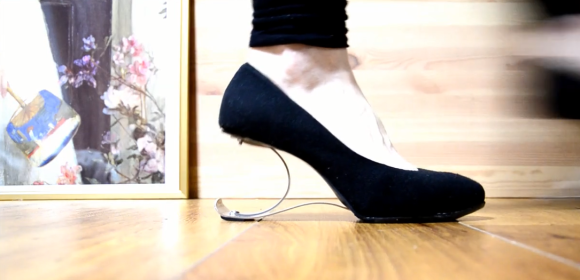
I’ve always been a little confused by high heels. It’s partially because I’m not so tall myself and don’t really have much of a height advantage to spare (even if my date is wearing flats), and partially because if I’m looking at a woman there are probably enough other things that are going to attract my gaze that she’s likely to ask me to stop staring at her long before I get to her shoes, no matter how nice they may look.
High heels seem like an even odder choice in Japan, where the reliance on public transportation means walking around for long stretches of time in shoes where comfort and mobility seem to have been afterthoughts in the design process. Still, many women in Japan step out in high heels as part of their plan to present a femininely fashionable or snappy professional image. Now, one Japanese designer is trying to help those women not only look good, but help their feet feel good as well with a revolutionary ergonomic redesign of high heels.
Some people insist that if a woman is uncomfortable in heels she should simply wear flats, but Yasuyuki Yamada, a biomechatronics researcher at Tokyo’s Chuo University, says that’s not always an option. Japan takes appearances very seriously, and Yamada points out that even in the absence of an explicit dress code dictating high heels, in many professional settings there’s a tacit understanding that women should wear them, lest they appear too casual in the workplace. Yamada also points out that many women are unwilling to go without the stylish silhouette produced by wearing high heels even when not in the office, and that many trendy women’s fashions are specifically designed to pair well with heels.
Because of that, Yamada went back to the drawing board in order to come up with a design that keeps the extra height of a high heel but takes away some of the pain and stress on the tendons of the toes, foot, and ankle.
The resulting shoes, called YaCHAIKA, feature a spring-like heel made up of two curved planes which help to absorb some of the impact of each step. This isn’t just a theoretical effect, either, as shown by Yamada’s motion-capture analysis and testing of the unique heels.
There’s even a bit of history tied up in the design. Although “YaCHAIKA” sounds a lot like a Japanese phrase meaning “Let’s do this,” the name was actually chosen to honor Valentina Tereshkova, who in 1963 became the first woman in space. Tereshkova’s call sign was chaika, meaning seagull , and her transmission from space of “Ya Chaika” (“This is seagull”) was a historical moment.
▼ Yamada also points out that the heels’ design resembles the spread wings of a soaring gull.
YaCHAIKA was recently nominated for the prestigious James Dyson Award for student design, and Yamada plans to exhibit an improved model at this October’s upcoming Tokyo Design Week. The designer is hoping for an enthusiastic response that can pave the way to mass-production of the shoes and retail sales, helping to literally put a spring in women’s steps and a smile on their faces.
Source: Jin, Huffington Post Japan, Fashion Snap
Images: Vimeo/Bal a Design